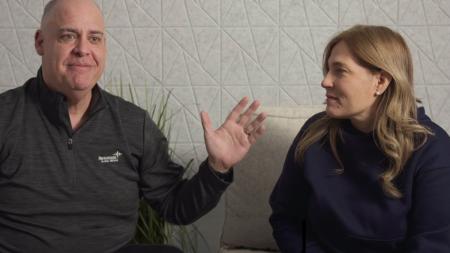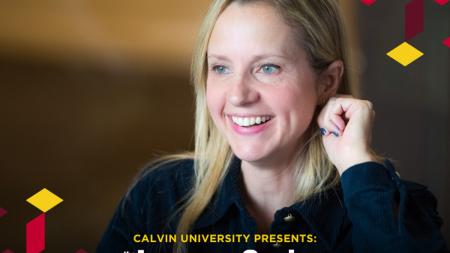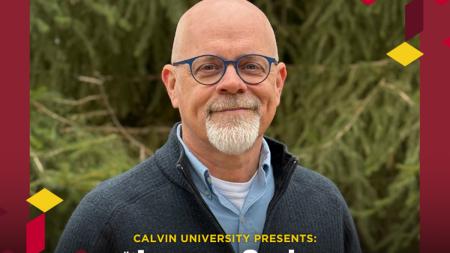Ableism in the Church

“I’m a disabled white woman in my thirties with shoulder-length, straight, blondish hair. I’m wearing a black dress with colorful lightning bolts on it so that you know I’m fun. And I’m sitting in my black-and-blue mobility scooter named ‘Diana, Princess of Themyscira’ after Wonder Woman – complete with a bedazzled Wonder Woman W on the front,” said Dr. Amy Kenny as she began her talk at the Calvin University January Series.
Kenny, a scholar, author, and professor of Shakespeare, shared her visual description on stage at Calvin University’s Covenant Fine Arts Center as a way to make her talk more accessible to people with visual impairments. It was a great lead-in to the rest of her talk on ableism and what can be done to fight it, especially in the church.
“You may have noticed that I am physically disabled,” Kenny began. “I say disabled, or what we call identity-first language, to describe myself to reclaim the word, and show that I’m not ashamed to be disabled.”
While Kenny is not ashamed of her disability, she said that those in churches often act as if she should be.
“In many modern churches you can attend a Sunday service without ever interacting with a disabled person, let alone a disabled leader,” Kenny explained. “Disabled people are 26 percent of the U.S population and 15 percent of the global population, and yet we are often nowhere to be found in church life and leadership.”
This is a loss that we ought to mourn and rally against, she said. “We are missing out on the prophetic witness of disabled people in our churches.”
Kenny’s talk focused on five statements that strangers often say to her, and how they are problematic:
- You’ll be healed if you just believe.
- I don’t even think of you as disabled.
- You are such an inspiration.
- You’ll be healed in heaven.
- I’d rather die than be disabled.
For each of these well-intentioned phrases, Kenny shared several stories from her own life and from her book My Body Is Not a Prayer Request.
“My body is fearfully and wonderfully made. I am not the before picture in a prayer makeover, or the symbol of sin used to guilt anyone else into repentance,” she explained.
She also shared how the five statements reveal ableist ideas prevalent in our churches.
“It is no wonder that many of our churches have absorbed the core spiritual lie known as ableism – discrimination against disabled folks – when the landmark legislation that provided civil rights for disabled people in the United States is something that some Christian communities fought against,” she explained.
Kenny was referring to the Americans with Disabilities Act (ADA) that became law in the United States in 1990. The civil rights legislation prohibits discrimination against individuals with disabilities and made it mandatory for schools, transportation, and public spaces to be accessible to persons with disabilities. Churches, however, are excluded from this legislation because many religious leaders fought against it, saying the ADA “imposed burdensome costs and needless injury to religious exercise.”
“Alongside chanting ‘come just as you are’ and blasting ‘WWJD’ [What Would Jesus Do] on every bracelet, mug, and tshirt, many Christian spaces fought to exclude disabled people,” Kenny said. “The message was clear. We are simply not worth the cost. Money was more important than disabled people.”
And while this message may have been unintentional, she said, it has continued to be communicated by the way churches ignore the needs of disabled people and fail to see how the lived experiences of people with disabilities could be beneficial to the whole community.
“Throughout Scripture we encounter disabled people at the forefront of the work that God chooses to do with humanity,” said Kenny. Yet the church often glosses over the fact that Moses, Isaac, Jacob, Paul, and others had disabilities. Even Jesus, she argued, had a broken body after the crucifixion, but we don’t consider him as someone with a disability.
If we can overcome our ableist notions that there is such a thing as a “perfect body” and that people with disabilities are “broken” and in need of healing, we could gain crucial insights that could help the church, Kenny explained.
“You might not know it, but you are likely already benefiting from the innovations of disability culture. Everything from the electric toothbrush to texting to the touch screen to the Snuggie to the potato peeler was created by and for disabled people,” she said. “These assistive technologies, these facets of our everyday life that we can no longer imagine living without, exist because of the innovation of disability. We are uniquely creative because we live in a world that is not built for our body minds.”
In the same way, churches could grow and be stretched if they welcomed and made room for the lived experiences and faith of people with disabilities, said Kenny.
“My disabled body is pure, holy, set free, capable, and meaningful to the kingdom. My disabled body is made in the image of the one who put the stars in their place, told the oceans where to stop, and designed the messy and crooked community of creation,” she concluded. “My disabled body is composed of the same stuff as the stars. It is time for the world and the church to notice our shine.”
CRCNA’s Disability Concerns has named Kenny’s book My Body Is Not a Prayer Request, as their book of the year. They are encouraging churches to hold book clubs to discuss this book and can make 10 copies of the book available to each congregation, thanks to support from the Calvin Institute of Christian Worship. To learn more, complete this form.


